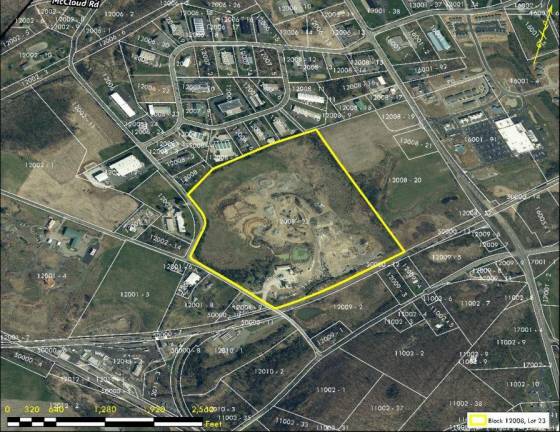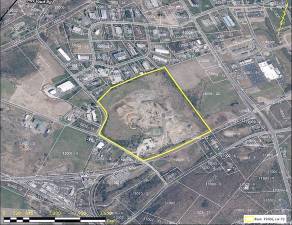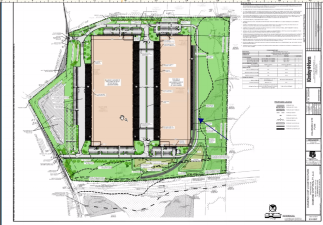Sparta’s mega warehouse proposal continues to spark public outrage
SPARTA. At the June 14 Sparta Township Council meeting, the issue returned, with residents requesting a reversal of the original ordinance and more transparency overall.

The public comment period during the June 14 Sparta Township Council meeting was lively — and informative. The council heard a lot of questions about the Diamond Chip warehouse project and the amendment ordinance that made it possible.
Attorney Neil Clark, representing the community, asked the council when the community could expect to receive a draft moratorium on future warehouses. He asked them to look at it the State Planning Commission’s guidelines and recommendations on warehouses. Mayor David Smith commented that the Council was doing a capacity analysis.
Councilwoman Molly Whilesmith said, “If we do this we’re preventing another application and another warehouse.” Councilwoman Christine Quinn responded, “You can’t rescind ordinances. It could have an effect on warehouses there now.” Rescinding the controversial ordinance should not affect existing warehouses, however, since previous warehouses were built prior to the change in ordinance.
Clark said a capacity allowance would have been a better idea, but it did not cover intensity of use. An 880,000-square-foot warehouse that requires a lot of trucks, vs. a data center warehouse may have same space, but a very different effect, he said.
Robert Benecke, who introduced himself as a financial advisor and re-development consultant, making his first appearance at these meetings, responded: “Good point; it depends on what the final tenant looks like.”
A capacity analysis means looking at more than just what will fit in the spot; according to Benecke, “It would take care of all that; it goes to utilities, infrastructure, electric service, traffic and feeder roads. Once you have a permitted use, traffic analysis is no longer a reason for a denial of a permitted use application,” he said.
Ordinance Approval Process
Clark then got to the heart of the matter. “I feel upset because I think the ordinance should have been denied seven months ago when the ordinance was passed and now there’s not much we can do. How did we get here? Why did this happen? I asked each of you if you knew this ordinance was about this project and you said no.”
Clark looked back at past minutes, where professional(s) explained the purpose for the ordinance. “There’s no disclosure that this was for the Diamond Chip Warehouse — which [the developer] have told you that this was for.” Clark asked, “If they knew then, would this have made a difference in their vote? “I think Molly Whilesmith answered that; she said ‘I wouldn’t have voted for this, had you told me.’ You didn’t have the information to make an informed decision. That means it was a material omission and would have affected the outcome of the decision.”
“If it would have affected the outcome, would someone have a duty to disclose that?” People expressed concern that if the ordinance is removed, and applied retrospectively to Diamond Chip, it might invite a lawsuit from the developer, Clark said. “It’s not Molly who did that. It’s the professionals; they had a duty to disclose that information and they did not; that’s why you are here. And I hope you will find out how you got here and implement procedures so it doesn’t happen again.”
“We need to ask the professionals every week, ‘Hey, have you got any interest from developers? What is it? What’s the project? What would it entail? Do we need to do a capacity analysis? If we can’t fix this, maybe we can learn from it and we won’t have another warehouse. And maybe you can build back the trust that unfortunately you’ve lost.” Clark said to applause from audience.
Transparency Concerns
Sparta resident and Washington Post contributor Jack Wright added, “I asked all of you directly — do you think this project is a good idea?” Councilman Dan Chiariello responded, “I don’t want to comment on this project, but, do I think the ordinance was a good idea? No.”
Wright categorized the runaround that community members got when asking questions as a “Regulatory Circulatory Reference.”
“The planning board says to go to the zoning board; the zoning board says go to the planning board. You as elected officials must not enable them. You have the opportunity to stop it,” he ended to applause.
Speaker Jim Castimore commented that Wright was badgering the council. He said the Sparta Planning Board had not heard all the testimony and needed to proceed. “It is what it is,” he said and was loudly repudiated by the audience.
“No it isn’t,” some audience members said, “It wasn’t transparent.”
Unrelenting, Castimore said, “You had your opportunity,” and the audience roared back, “No we didn’t!”
Environmental Concerns
Dean Blumetti, chair of the Sparta Township Environmental Commission, pointed out the developer is using their own experts to report on environmental effects and asked if the township would consider independent analysis by an environmental expert. Some residents expressed concern about possible negative effects on the aquifer under the site.
Earlier this year, the Environmental Commission’s report had concluded, “There exists insufficient evidence that the applicant has adequately acknowledged and addressed the environmental concerns and adverse impacts associated with this development on this environmentally sensitive area. The Sparta Township Environmental Commission recommends that this application be rejected due to the significant deficiencies identified above. The risks associated with the proposed development do not align with the reasonable preservation and protection of the natural resources of Sparta and its residents. [...] The Environmental Commission would be in support of an extension of the public review period in the interest of full community engagement.”
Blumetti said, “If we find serious environmental issues, we can then get involved with the DEP process. The developer can’t come back for approval until they have received all their DEP permits.”
Benecke said, “The old Economic Development zones did not generate a lot of development.” In 2019 Harbor Consulting did a master plan review and suggested the town do something with the ED zone, he said. “The premise is [Harbor Consultants] wanted to utilize the zone because it was ‘fallow.’”
It remains to be seen if the tax revenue from the proposed warehouse project would offset additional costs, financial and otherwise, to the town. Residents appear to be overwhelmingly against it.
“I feel upset because I think the ordinance should have been denied seven months ago when the ordinance was passed and now there’s not much we can do. How did we get here? Why did this happen? I asked each of you if you knew this ordinance was about this project and you said no,” said attorney Neil Clark.


